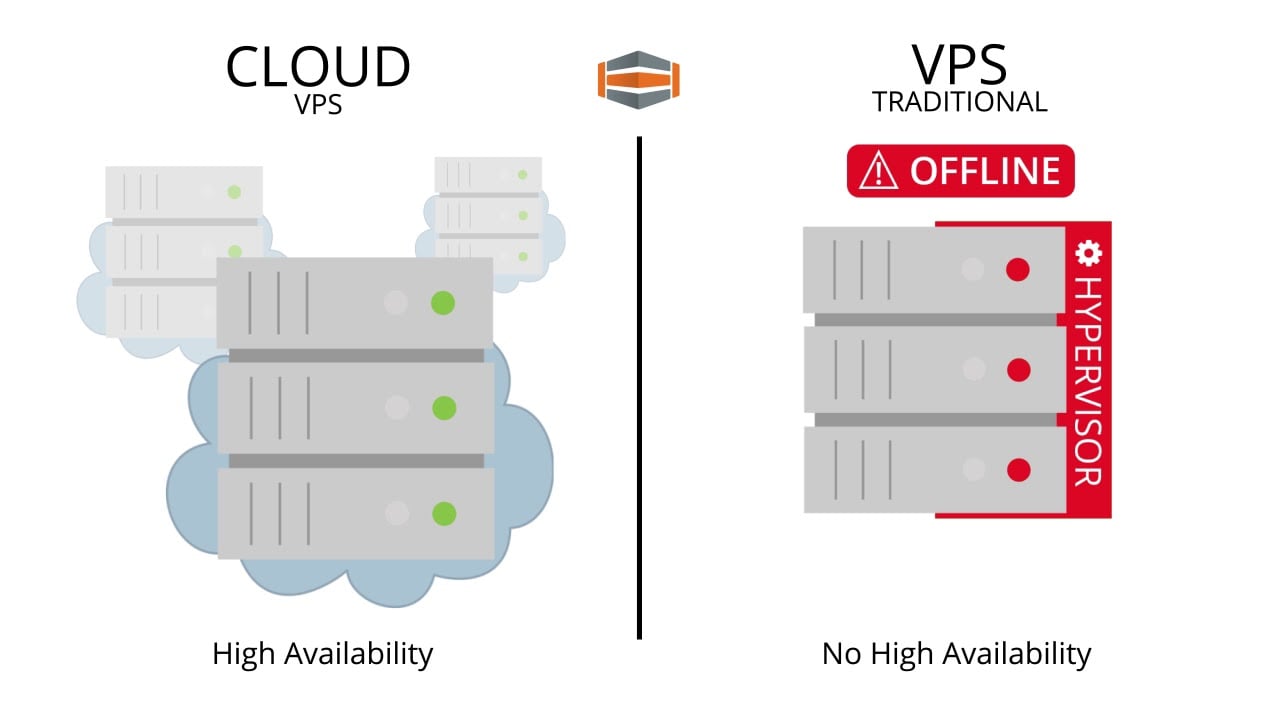Cloud hosting and VPS hosting are two different types of hosting services, with some key differences:
- Infrastructure: Cloud hosting is a distributed network of servers that work together to host websites and applications, while VPS hosting is a single server that is partitioned into multiple virtual private servers.
- Scalability: Cloud hosting is highly scalable, meaning that resources can be easily added or removed as needed, while VPS hosting typically has more limited scalability and may require additional manual configuration.
- Cost: Cloud hosting tends to be more expensive than VPS hosting, as it provides more resources and greater flexibility.
- Reliability: Cloud hosting is generally more reliable than VPS hosting, as it is designed to provide redundancy and failover mechanisms to ensure high availability. VPS hosting is dependent on a single physical server, which can be a single point of failure.
- Management: Cloud hosting typically requires less management on the part of the user, as many of the tasks are automated and managed by the hosting provider. VPS hosting requires more hands-on management, as the user is responsible for configuring and maintaining the server.
Ultimately, the choice between cloud hosting and VPS hosting will depend on your specific needs and budget. If you need scalability, reliability, and high availability, then cloud hosting may be the best option. If you have a lower budget and require more control over your hosting environment, then VPS hosting may be the better choice.
Which Hosting performs best in spike traffic Clouds or VPS
In terms of handling spike traffic, cloud hosting typically performs better than VPS hosting.
Cloud hosting is designed to provide on-demand resources to handle sudden spikes in traffic. The resources are distributed across multiple servers, so if one server becomes overwhelmed, the workload can be shifted to other servers in the network. This means that cloud hosting can handle sudden bursts of traffic without experiencing any downtime or slowdowns.
On the other hand, VPS hosting has a limited amount of resources available to it, and if a sudden spike in traffic occurs, the resources may become overwhelmed, causing the server to slow down or crash.
That being said, it’s important to note that the performance of both cloud hosting and VPS hosting will depend on various factors, such as the hardware and software configurations, the amount of traffic, and the type of content being served. It’s also important to choose a hosting provider with a good reputation for handling high traffic loads.
Which Hosting performs best in terms of price Clouds or VPS
In terms of price, VPS hosting is generally less expensive than cloud hosting.
VPS hosting is a more traditional type of hosting, where a single physical server is divided into multiple virtual servers, each with its own dedicated resources and operating system. Because VPS hosting is a more established technology, it tends to be less expensive than cloud hosting.
Cloud hosting, on the other hand, is a more advanced and flexible hosting solution that uses a distributed network of servers to provide scalable resources on demand. The infrastructure required to support cloud hosting is typically more expensive than that of VPS hosting, which can lead to higher costs.
However, the cost of hosting will depend on various factors such as the hosting provider, the level of resources required, and any additional features or services offered. It’s always a good idea to compare prices and features across different hosting providers to find the best option that meets your specific needs and budget.
Which Hosting performs best in terms of Security Clouds or VPS
Both cloud hosting and VPS hosting can provide secure hosting environments, but the level of security will depend on various factors such as the hosting provider, the specific configuration, and any additional security measures implemented.
Cloud hosting may have an advantage in terms of security because it uses a distributed network of servers, which can provide redundancy and failover mechanisms that can help protect against security threats. Additionally, cloud hosting providers often have advanced security measures in place such as firewalls, intrusion detection and prevention systems, and security monitoring tools.
VPS hosting can also be secure, but because it relies on a single physical server that is partitioned into multiple virtual private servers, there is a risk of security breaches if one VPS is compromised. However, VPS hosting providers can still implement security measures such as firewalls, antivirus software, and regular backups to help protect against security threats.
In general, the level of security for both cloud hosting and VPS hosting will depend on the specific hosting provider and the measures they take to ensure the security of their hosting environments. It’s important to choose a reputable hosting provider and take additional security measures such as implementing strong passwords, regularly updating software and applications, and using SSL certificates for secure communication.
How much traffic Clouds hosting can handle

The amount of traffic that cloud hosting can handle will depend on various factors such as the specific hosting provider, the level of resources allocated, and the type of content being served.
Cloud hosting is designed to provide scalable resources on demand, meaning that additional resources such as CPU, memory, and storage can be added as needed to handle increased traffic. This makes cloud hosting highly scalable and able to handle large amounts of traffic.
The amount of traffic that cloud hosting can handle will also depend on the specific pricing plan and the level of resources allocated. Many cloud hosting providers offer different pricing plans with varying levels of resources, so it’s important to choose a plan that meets your specific needs and budget.
It’s also important to note that the amount of traffic a website can handle will depend on various factors such as the website design, the type of content being served, and the number of concurrent users. Therefore, it’s always a good idea to regularly monitor website performance and traffic levels to ensure that the hosting environment is able to handle the traffic load.
How much traffic VPS can handle
The amount of traffic that a VPS (Virtual Private Server) can handle will depend on various factors such as the specific hosting provider, the level of resources allocated to the VPS, and the type of content being served.
VPS hosting typically offers a dedicated amount of CPU, memory, and storage resources to each virtual server, which can make it more reliable and scalable compared to shared hosting. However, the amount of resources allocated to each VPS will depend on the specific pricing plan and the VPS configuration.
The amount of traffic a VPS can handle will also depend on the website design, the type of content being served, and the number of concurrent users. If a website experiences sudden spikes in traffic, the VPS may become overwhelmed if it does not have enough resources allocated to it.
In general, VPS hosting can handle moderate to high levels of traffic, but the amount of traffic it can handle will depend on the specific hosting provider and the level of resources allocated to the VPS. It’s always a good idea to regularly monitor website performance and traffic levels to ensure that the VPS is able to handle the traffic load.
Can we use load balancer in VPS
Yes, load balancers can be used with VPS hosting.
A load balancer is a device or software that distributes incoming network traffic across multiple servers or VPS instances. It can help to improve website performance, availability, and reliability by distributing traffic evenly across multiple servers, reducing the workload on any one server or VPS.
When using load balancers with VPS hosting, the load balancer can distribute incoming traffic across multiple VPS instances, helping to improve website performance and availability. This is particularly useful in situations where a single VPS instance is not enough to handle the incoming traffic, or to provide redundancy in case one VPS instance fails.
Many hosting providers offer load balancing as a feature or service that can be added to a VPS hosting plan. Additionally, there are also open-source load balancing software options available that can be used with VPS hosting.
Which Hosting performs best in spike traffic Clouds or VPS
In terms of handling spike traffic, cloud hosting typically performs better than VPS hosting.
Can we use load balancer in VPS
Yes, load balancers can be used with VPS hosting.
How much traffic VPS can handle
The amount of traffic that a VPS (Virtual Private Server) can handle will depend on various factors such as the specific hosting provider, the level of resources allocated to the VPS, and the type of content being served.
How much traffic Clouds hosting can handle
Cloud hosting is designed to provide scalable resources on demand, meaning that additional resources such as CPU, memory, and storage can be added as needed to handle increased traffic. This makes cloud hosting highly scalable and able to handle large amounts of traffic.








